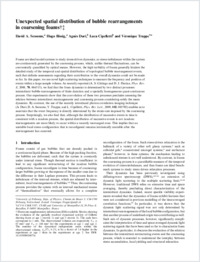Unexpected spatial distribution of bubble rearrangements in coarsening foams
- Sessoms, David A. University of Fribourg, Dept. of Physics, Switzerland
- Bissig, Hugo University of Fribourg, Dept. of Physics, Switzerland
- Duri, Agnès University of Montpellier, France
- Cipelletti, Luca University of Montpellier, France
- Trappe, Véronique University of Fribourg, Dept. of Physics, Switzerland
-
03.06.2010
Published in:
- Soft Matter. - 2010, vol. 6, no. 13, p. 3030-3037
English
Foams are ideal model systems to study stress-driven dynamics, as stress-imbalances within the system are continuously generated by the coarsening process, which, unlike thermal fluctuations, can be conveniently quantified by optical means. However, the high turbidity of foams generally hinders the detailed study of the temporal and spatial distribution of topological bubble rearrangement events, such that definite assessments regarding their contribution to the overall dynamics could not be made so far. In this paper, we use novel light scattering techniques to measure the frequency and position of events within a large sample volume. As recently reported (A. S. Gittings and D. J. Durian, Phys. Rev. E, 2008, 78, 066313), we find that the foam dynamics is determined by two distinct processes: intermittent bubble rearrangements of finite duration and a spatially homogeneous quasi-continuous process. Our experiments show that the convolution of these two processes precludes assessing the relation between intermittent rearrangements and coarsening process considering solely the mean dynamics. By contrast, the use of the recently introduced photon correlation imaging technique (A. Duri, D. A. Sessoms, V. Trappe, and L. Cipelletti, Phys. Rev. Lett., 2009, 102, 085702) enables us to ascertain that the event frequency is directly determined by the strain-rate imposed by the coarsening process. Surprisingly, we also find that, although the distribution of successive events in time is consistent with a random process, the spatial distribution of successive events is not random: rearrangements are more likely to occur within a recently rearranged zone. This implies that an unstable local stress configuration that is reconfigured remains intrinsically unstable after the rearrangement has occurred.
- Faculty
- Faculté des sciences et de médecine
- Department
- Département de Physique
- Language
-
- English
- Classification
- Physics
- Other electronic version
- License
-
License undefined
- Identifiers
-
- RERO DOC 20306
- Persistent URL
- https://folia.unifr.ch/unifr/documents/301594
Statistics
Document views: 96
File downloads:
- pdf: 135
